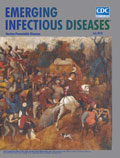
Volume 24, Number 7—July 2018
Etymologia
Etymologia: Cytokines
On This Page
From the Greek cyto (cavity or cell) and kine (movement), cytokines are proteins involved in cell signaling and function as immunomodulating agents. Cytokines are produced by immune cells (e.g., macrophages, B and T lymphocytes, mast cells, neutrophils, natural killer cells), endothelial cells, fibroblasts, and stromal cells.
Although the term cytokine had not yet even been defined, interferon-α, the first cytokine known, was identified in 1957 as a protein that interfered with virus replication. Activities of interferon-γ and interleukin-2 were identified in 1965. Macrophage migratory inhibitory factor was identified in 1966. In 1969, Dumonde and colleagues proposed the term lymphokine to describe proteins secreted from lymphocytes. Proteins derived from macrophages and monocytes were later called monokines. In 1974, Cohen and colleagues reported production of macrophage migration inhibitory factors in virus-infected fibroblasts, which led (finally) to proposal of the term cytokine.
References
- Cohen S, Bigazzi PE, Yoshida T. Commentary. Similarities of T cell function in cell-mediated immunity and antibody production. Cell Immunol. 1974;12:150–9. DOIPubMed
- Dumonde DC, Wolstencroft RA, Panayi GS, Matthew M, Morley J, Howson WT. “Lymphokines”: non-antibody mediators of cellular immunity generated by lymphocyte activation. Nature. 1969;224:38–42. DOIPubMed
- Gordon J, MacLean LD. A lymphocyte-stimulating factor produced in vitro. Nature. 1965;208:795–6. DOIPubMed
- Isaacs A, Lindenmann J. Virus interference. I. The interferon. Proc R Soc Lond B Biol Sci. 1957;147:258–67. DOIPubMed
- Kasakura S, Lowenstein L. A factor stimulating DNA synthesis derived from the medium of leukocyte cultures. Nature. 1965;208:794–5. DOIPubMed
- Wheelock EF. Interferon-like virus-inhibitor induced in human leukocytes by phytohemagglutinin. Science. 1965;149:310–1. DOI


































No hay comentarios:
Publicar un comentario